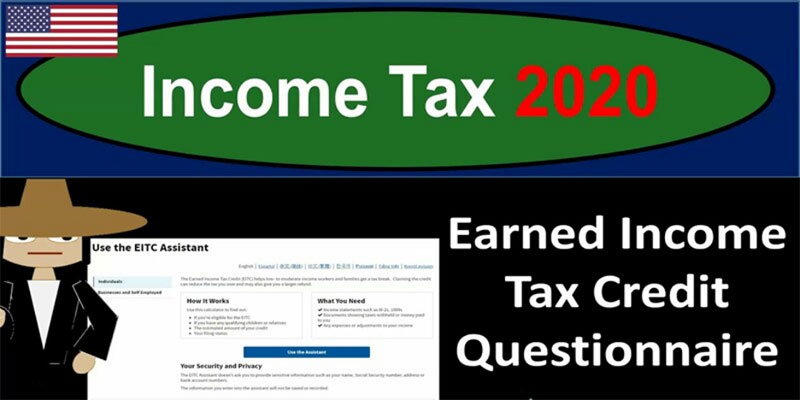How Much Do You Understand The Earned Income Credit?
A tax benefit known as the Earned Income Tax Credit (EITC) might reduce the federal taxes you owe or even provide you with a refund. The credit is available to everyone, regardless of marital status or number of dependents. The primary qualification is financial independence through employment. You may owe no federal tax after using this credit. If your earned income tax credit (EITC) is more than your tax liability, the excess will be returned to you as a tax refund. When you are eligible for the credit but have no income tax liability, you may still be able to get a refund. Extending the reach of the federal EITC, 29 states, as well as the District of Columbia, have created their versions of the credit. Determine if a tax credit is available in your state by looking at the EITC map.
What Exactly is the Earned Income Tax Credit (EITC)?
As the name implies, the Earned Income Tax Credit is a tax cut given to low-income employees and their families based on their wages, salaries, tips, and other forms of compensation and their earnings from self-employment. Even though the EITC has been around for decades, the IRS reports that around 20% of eligible citizens still need to submit a claim for the benefit. This year's credit is more substantial than ever, and it's available to a broader range of employees owing to President Biden's American Rescue plan.
What May I Receive Through The EITC?

Whether or whether you qualify for a more significant credit is determined by your yearly income, family size, and marital status. The maximum value of the credit in 2021 is $6,728. The credit amount increases as money is generated up to a maximum, beyond which it decreases progressively. A more significant tax credit is available to families with more children. If you expect your investment income to be more than $10,000 in 2021, you will not qualify for the EITC. A person's capital gains, dividends, and interest from investments are all considered investment income.
Can I receive the EITC?
The following three factors determine EITC eligibility:
- Money: You must get a job and bring in some cash flow. All-year availability is optional for your job. Your total income, including interest and dividends, can be within limits shown in the table. Wages, salaries, tips, disability compensation from an employer, earnings from self-employment, military pay, union strike benefits, and pensions are all examples of earned income.
- You, your spouse, and any children you plan to claim as EITC recipients must all have valid Social Security numbers to apply for and receive the credit. If you have a Social Security Number, you are eligible for the EITC regardless of your citizenship status. Whenever you file your taxes using an ITIN, you will not be eligible for the federal EITC. Please go to Tax Filing with Immigrant or DACA Status for further details. If you have an ITIN and live in California, Colorado, Maine, Maryland, or New Mexico, you may qualify for the state EITC.
Can my child receive the EITC?
To be considered a "qualified kid" for the EITC, a child must meet all three of the following criteria:
- The kid must be your biological or legally adopted sons and daughters; your stepchild or foster child; your younger sibling, stepsibling, half-sibling, or their descendant; or a child placed with you for foster care by a government agency.
- The kid must be under the age of 19, or under the age of 24 if enrolled as a full-time student, or of any age if totally and permanently incapacitated.
- More than half of the year must be spent in the United States with the child. Time spent together in residence need not be continuous.
How do I assert the EITC?

The Earned Income Tax Credit (EITC) may only be claimed by filing a tax return. "Schedule EIC" must be filed alongside an EITC claim for a kid. Using a tax preparation service costs money and affects your refund. Thankfully, there are zero-cost alternatives to consider. For free tax preparation by IRS-approved volunteers, visit a VITA facility or GetYourRefund.org. If you do not have any income from self-employment, you may submit your taxes online for free by visiting MyFreeTaxes.com.
Conclusion
One such tax benefit is the Earned Income Tax Credit (EITC), sometimes known as the Earned Income Credit. The size of your family, your filing status, and your yearly income all play a role in determining whether or not you are eligible for the tax credit. When the earned income tax credit (EITC) exceeds the tax liability, the excess is refunded to the taxpayer. Income restrictions apply to the credit. Low- and middle-income employees are eligible for the earned income tax credit (EITC or EIC), a refundable tax credit. It depends on filing status, income, and the number of dependents, the earned income credit for the tax year 2022 is anywhere from $560 to $6,935. The credit's value in 2023 ranges from $600 to $7,430. Those who do not have any dependents are eligible. Remember to include the credit on your tax return if you qualify.